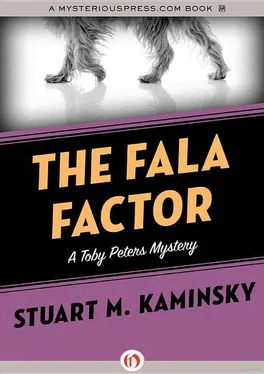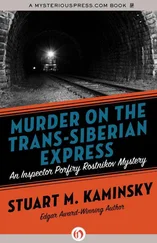Stuart Kaminsky - The Fala Factor
Здесь есть возможность читать онлайн «Stuart Kaminsky - The Fala Factor» весь текст электронной книги совершенно бесплатно (целиком полную версию без сокращений). В некоторых случаях можно слушать аудио, скачать через торрент в формате fb2 и присутствует краткое содержание. Жанр: Криминальный детектив, на английском языке. Описание произведения, (предисловие) а так же отзывы посетителей доступны на портале библиотеки ЛибКат.
- Название:The Fala Factor
- Автор:
- Жанр:
- Год:неизвестен
- ISBN:нет данных
- Рейтинг книги:3 / 5. Голосов: 1
-
Избранное:Добавить в избранное
- Отзывы:
-
Ваша оценка:
- 60
- 1
- 2
- 3
- 4
- 5
The Fala Factor: краткое содержание, описание и аннотация
Предлагаем к чтению аннотацию, описание, краткое содержание или предисловие (зависит от того, что написал сам автор книги «The Fala Factor»). Если вы не нашли необходимую информацию о книге — напишите в комментариях, мы постараемся отыскать её.
The Fala Factor — читать онлайн бесплатно полную книгу (весь текст) целиком
Ниже представлен текст книги, разбитый по страницам. Система сохранения места последней прочитанной страницы, позволяет с удобством читать онлайн бесплатно книгу «The Fala Factor», без необходимости каждый раз заново искать на чём Вы остановились. Поставьте закладку, и сможете в любой момент перейти на страницу, на которой закончили чтение.
Интервал:
Закладка:
The dog’s full name was Murray the Outlaw of Fala Hill. He had been given to FDR by Margaret Suckley in 1940. Margaret was a close friend of the family. The family had many dogs, including a German shepherd who had recently taken a chunk out of the prime minister of Canada, but Fala was the president’s dog and had proven to be the only dog in the family that really liked the White House. That Roosevelt loved the dog was without question. It was also evident that the dog returned the affection. Things, she said, could be pretty tense at the White House. Public visits had stopped, everyone who entered had to be fingerprinted and issued a pass, and, most unsettling, gun crews were now posted in the wings of the residence. There was, in fact, a dog-supposedly Fala-in the White House at the moment. The president had noticed a number of changes in the dog, but meetings and war planning had kept him from questioning its identity. Mrs. Roosevelt had gradually become convinced that the dog was not Fala at all but a strikingly similar animal with a radically different temperament. She had kept her observations to herself for several reasons. First, she did not want to upset the president, and second, she didn’t want to appear demented. The press, she said, took every opportunity to attack her and she did not wish to be an embarrassment to the president. Meanwhile, she had been occupied with moving their New York address from East Sixty-fifth to a seven-room apartment in Washington Square. So, aside from a few inquiries, she had not pushed her suspicion further. The slightest suggestion of her concern, she said, might be used by the press, the Republicans, the Japanese, or the Germans against the president.
There were two things that made Mrs. Roosevelt believe that the kidnapped dog was in Los Angeles. First, a veterinarian, Roy Olson, who had treated Fala, had suddenly packed up and moved from Washington to Los Angeles. Mrs. Roosevelt had initiated a discreet inquiry in Los Angeles through a sympathetic Secret Service operative. The inquiry had turned up nothing but some eccentric characters. However, after the inquiry, among the many crank letters that came to the White House each day, there began to appear ones specifically mentioning the loss of Fala. The Secret Service, as it did with all threats, checked the signed letter from Los Angeles and concluded that the writer, a Jane Poslik who had worked for Roy Olson and had been contacted during the inquiry, was mentally disturbed and that her letter had not been a threat at all but the voicing of a paranoid fear suggested by the investigation. My job, if I took it, was to find enough information, if it existed, to make a formal investigation reasonable.
“One week from today,” she concluded, standing up, “on the eighth of May, I must be back in Washington for our first state dinner since Pearl Harbor. We will be entertaining the president of Peru. For a week I will remain in the Los Angeles area, where I do have some things to do, including gathering material for my column, and though I have resigned from the Office of Civil Defense, I have agreed to prepare a discreet report on California defense. May I assume you will accept the task?”
I stood up with her, thinking for the first time since I had seen her in my office that this would give me a week or two before I had to go back to checking out the Grumman job. Besides, it was my patriotic duty. I was thinking about how to bring up the question of money when I took the hand she offered me.
When she released my hand, she went into her shopping bag and pulled out an envelope, which she handed me.
“There is three hundred dollars in the envelope,” she said, pulling her coat around her shoulders and picking up the shopping bag. “It is my own personal money and I will provide more if it is needed. I cannot give you a check because I do not want my name on any document associated with this. I will, however, expect an itemization of your expenditures. My secretary knows your name and will take a message if I am not there when you call. Have you any questions?”
“None,” I said. “I’ll get right on it.”
Eleanor Roosevelt turned to look at the photograph of my father, Phil, me, and the dog. She paused for a second, looked at the picture, and then looked back at me and said, “Be careful Tobias, and keep me informed.”
With that, she was gone. I opened the envelope, found the pile of twenties, which I folded into my well-worn hecho-a-mano Mexican wallet, and memorized the phone number. I repeated it twenty times, imagined it written on the wall, and then tore it into small pieces, which I dropped into my empty wastebasket. Jeremy kept the floors clean and the wastebaskets empty.
There wasn’t much question about where I would begin. Finding Jane Poslik and Roy Olson didn’t even require my going to the phone book. Mrs. Roosevelt had provided both of their addresses. The only choice was which one to start with and that was easy, the woman who had written the letters.
I swept off the top of my desk, shoved the notebook and pencil into my pocket, took the final handful of All-Bran, washed it down with the cool remnants of Juarez coffee, and went into Shelly’s office. Seidman was gone, and I made a note to get in touch with my brother Phil before the day ended. I didn’t want him coming for me. It was never pleasant when Phil wound up coming for me, even when he started off reasonably friendly.
Shelly was sitting in his dental chair squinting at a pad of paper on his lap. He puffed away at his cigar and tapped his pencil on the pad. He heard me come back into the room and looked up.
“I’m working on an ad,” he explained. “How about ‘Good tooth care is vital for victory’?”
“Catchy,” I said.
“Sorta like the Rinso Jingle,” he mused. “You know, ‘Rinso White, Rinso White, happy little washday song.’ That’s the kind of thing I’m looking for, you know what I mean?”
“Sort of,” I said. “Look, I’ve got to go out. I’ve got a client. Will you-”
“You mean the one with the shopping bags?” he said, returning to his pad. “You should have her see me about those teeth. I can do all sorts of things with them.”
“I’m sure you could, Shel, but she’s from out of town, and I’m sure she’s got her own dentist,” I said.
“He isn’t doing much for her,” he went on, tapping his pencil. “You know she reminds me of someone. I just figured out who. You know that little lady in The Lady Vanishes , The English cookie, what’s her name, Lady something or Dame something.”
“I know who you mean,” I said. “I’ll check back in later.”
“Sure, sure,” Shelly told his pad. “Toby, I could use your advice before you go.”
“Go ahead,” I said. In situations like this I had for some time said “Shoot,” but since someone had taken me literally in Chicago a few years before and shot me, I had gone for the simple though less colorful “Go ahead.”
“Promised Mildred we’d go out this weekend,” Shelly said, taking his cigar from his mouth and dropping a fat ash on his smock, where he failed to notice it. “I could suggest Volez and Yolanda at the Philharmonic Hall. Life magazine says they’re the world’s greatest dancing couple. That might cost as much as four bucks for the good seats. Or we could go to the Musart and see She Lost It at Campeche . Even the best seats are only a buck each. The show’s been going on for almost a year and the ad in the paper says it’s ‘hot as a firebomb.’ What do you think?”
“Shel,” I said, reaching for the door. “Go for the culture even if it costs a few bucks extra. Mildred will appreciate it.”
I was through the door and standing in the anteroom when I heard Shelly say to himself, “Hot as a fire bomb,” and I knew where Mildred Minck would be on Saturday night.
Читать дальшеИнтервал:
Закладка:
Похожие книги на «The Fala Factor»
Представляем Вашему вниманию похожие книги на «The Fala Factor» списком для выбора. Мы отобрали схожую по названию и смыслу литературу в надежде предоставить читателям больше вариантов отыскать новые, интересные, ещё непрочитанные произведения.
Обсуждение, отзывы о книге «The Fala Factor» и просто собственные мнения читателей. Оставьте ваши комментарии, напишите, что Вы думаете о произведении, его смысле или главных героях. Укажите что конкретно понравилось, а что нет, и почему Вы так считаете.












